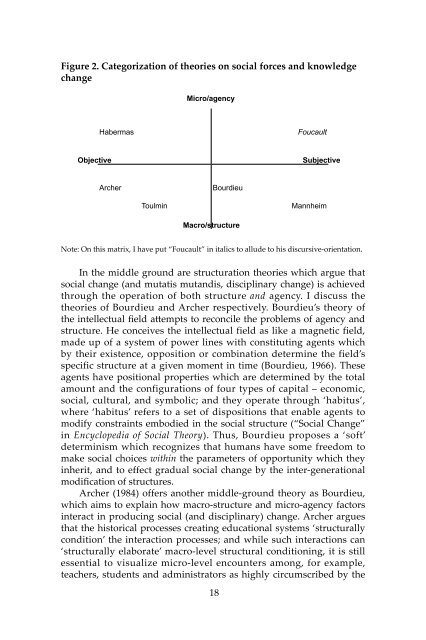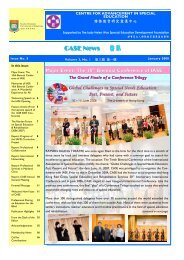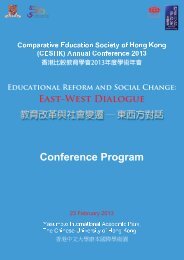Comparative Education Bulletin - Faculty of Education - The ...
Comparative Education Bulletin - Faculty of Education - The ...
Comparative Education Bulletin - Faculty of Education - The ...
Create successful ePaper yourself
Turn your PDF publications into a flip-book with our unique Google optimized e-Paper software.
Figure 2. Categorization <strong>of</strong> theories on social forces and knowledge<br />
change<br />
Habermas Foucault<br />
Archer<br />
Toulmin<br />
Micro/agency<br />
Objective Subjective<br />
Bourdieu<br />
Macro/structure<br />
18<br />
Mannheim<br />
Note: On this matrix, I have put “Foucault” in italics to allude to his discursive-orientation.<br />
In the middle ground are structuration theories which argue that<br />
social change (and mutatis mutandis, disciplinary change) is achieved<br />
through the operation <strong>of</strong> both structure and agency. I discuss the<br />
theories <strong>of</strong> Bourdieu and Archer respectively. Bourdieu’s theory <strong>of</strong><br />
the intellectual field attempts to reconcile the problems <strong>of</strong> agency and<br />
structure. He conceives the intellectual field as like a magnetic field,<br />
made up <strong>of</strong> a system <strong>of</strong> power lines with constituting agents which<br />
by their existence, opposition or combination determine the field’s<br />
specific structure at a given moment in time (Bourdieu, 1966). <strong>The</strong>se<br />
agents have positional properties which are determined by the total<br />
amount and the configurations <strong>of</strong> four types <strong>of</strong> capital – economic,<br />
social, cultural, and symbolic; and they operate through ‘habitus’,<br />
where ‘habitus’ refers to a set <strong>of</strong> dispositions that enable agents to<br />
modify constraints embodied in the social structure (“Social Change”<br />
in Encyclopedia <strong>of</strong> Social <strong>The</strong>ory). Thus, Bourdieu proposes a ‘s<strong>of</strong>t’<br />
determinism which recognizes that humans have some freedom to<br />
make social choices within the parameters <strong>of</strong> opportunity which they<br />
inherit, and to effect gradual social change by the inter-generational<br />
modification <strong>of</strong> structures.<br />
Archer (1984) <strong>of</strong>fers another middle-ground theory as Bourdieu,<br />
which aims to explain how macro-structure and micro-agency factors<br />
interact in producing social (and disciplinary) change. Archer argues<br />
that the historical processes creating educational systems ‘structurally<br />
condition’ the interaction processes; and while such interactions can<br />
‘structurally elaborate’ macro-level structural conditioning, it is still<br />
essential to visualize micro-level encounters among, for example,<br />
teachers, students and administrators as highly circumscribed by the
















